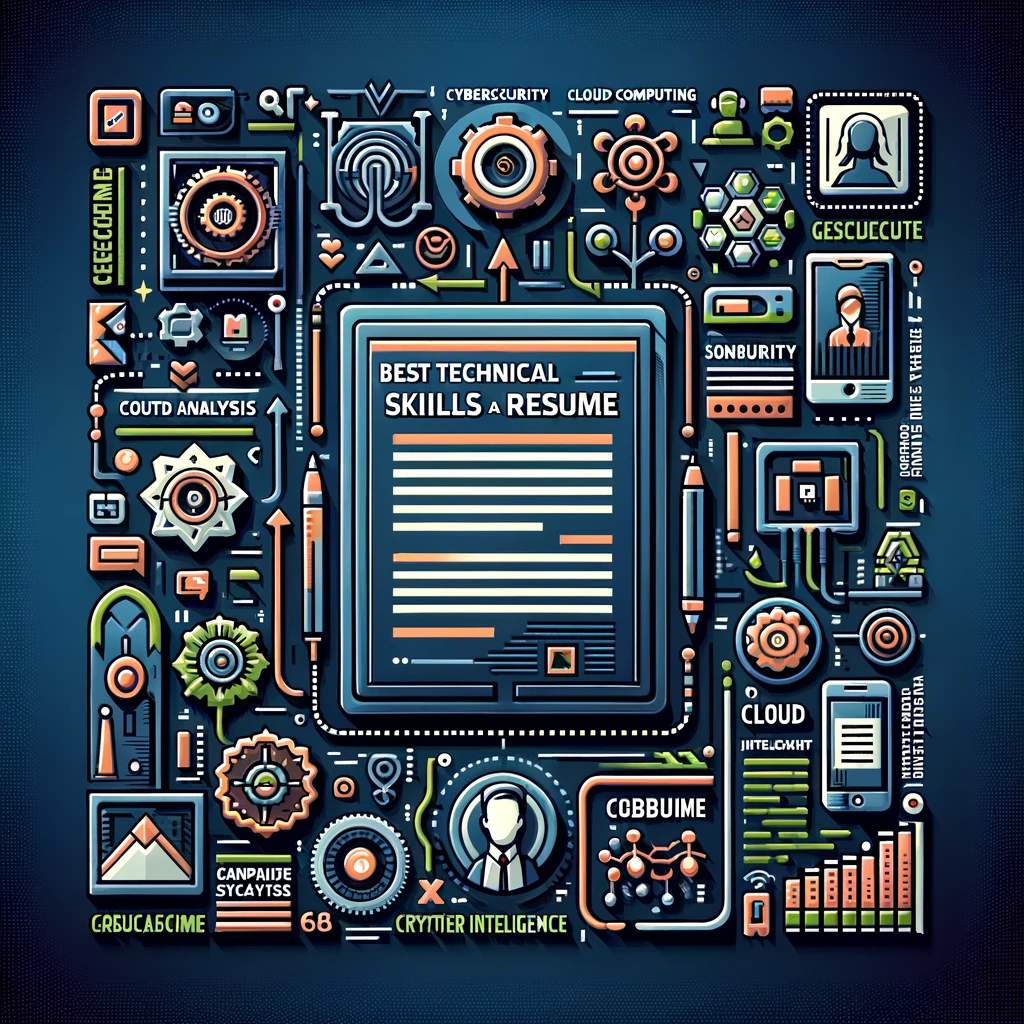10 Best IT Technical Skills For Your Resume(with examples)
What is Technical Skills?
Technical skills are the abilities and knowledge needed to perform specific tasks. They’re often related to information technology (IT), engineering, or other scientific areas. Think of them like the special skills you need to use computers, gadgets, or software. For example, knowing how to write code in programming languages like Python or Java, using software to create graphs or charts, or even being able to fix a computer are all technical skills. These skills are important because they let you do certain jobs that involve technology or specialized tools.
In simple terms, if you’re good at understanding how to use technology and can do tasks that require special knowledge or tools, you have technical skills. These are super useful and often needed for all sorts of jobs in today’s world, not just in tech companies but in many different fields like business, medicine, and art!
1. Programming and Coding
The ability to communicate with computers through coding and programming is akin to possessing a key to the digital kingdom. Whether it’s developing a sleek website using HTML, CSS, and JavaScript, automating a routine task with Python, or engineering a complex software solution with Java, the applications are boundless. For instance, a small business owner could leverage WordPress’s PHP to create a customized online store, demonstrating the direct impact of coding skills on entrepreneurial success.
- Skill: Writing and understanding computer code in languages like Python, Java, or C++.
- Detail: Being able to develop software, applications, or websites using programming languages. For example, using Python to automate tasks, analyze data, or build machine learning models.
2. Web Development
- Skill: Creating and maintaining websites using HTML, CSS, and JavaScript.
- Detail: Designing user-friendly website layouts, ensuring mobile responsiveness, and implementing interactive elements to enhance user experience.
3. Data Analysis
In the age of big data, the capacity to sift through vast datasets, extract meaningful insights, and make data-driven decisions is invaluable. Using SQL, professionals can manage databases efficiently, while Python’s libraries like Pandas and NumPy enable sophisticated data analysis. A marketer analyzing customer behavior patterns to tailor campaigns is a testament to the power of data skills in enhancing business strategies.
- Skill: Analyzing and interpreting complex data sets using statistical tools and software.
- Detail: Employing software like Excel, R, or Python libraries (Pandas, NumPy) to extract insights from data, perform statistical analysis, and visualize data trends for decision-making.
4. Cybersecurity
As digital threats evolve, the need for robust cybersecurity measures becomes paramount. Understanding the principles of secure network design, encryption, and ethical hacking can safeguard organizational assets. A cybersecurity analyst deploying firewalls and conducting penetration testing to protect sensitive data illustrates the critical role of technical skills in maintaining digital integrity.
- Skill: Protecting information systems and networks from cyber threats.
- Detail: Implementing security measures like firewalls and encryption, conducting vulnerability assessments, and responding to security breaches to safeguard digital assets.
5. Cloud Computing
The shift towards cloud computing has revolutionized how businesses operate, offering scalability, efficiency, and cost savings. Familiarity with platforms such as AWS, Azure, or Google Cloud enables professionals to deploy and manage applications in the cloud. An IT specialist migrating company data to a cloud-based infrastructure showcases the strategic application of cloud computing skills.
- Skill: Utilizing cloud platforms (AWS, Azure, Google Cloud) for storing, processing, and managing data remotely.
- Detail: Deploying applications in the cloud, managing cloud infrastructure, and ensuring data security and compliance in a cloud environment.
6. Machine Learning and Artificial Intelligence
The realms of machine learning and artificial intelligence are shaping the future, automating processes, and creating intelligent systems. From developing predictive models in finance to enhancing customer experiences with chatbots, the practical applications are vast. A data scientist employing TensorFlow to build a machine learning model for predictive analytics exemplifies the transformative potential of AI skills.
- Skill: Developing algorithms and models that enable machines to learn from data and perform tasks without being explicitly programmed.
- Detail: Using libraries like TensorFlow or PyTorch to build models that can recognize patterns, make predictions, or understand natural language.

7. Project Management
The orchestration of resources, timelines, and team dynamics to achieve project goals is an art refined by technical tools. Software such as Asana for task management and Microsoft Project for detailed project planning exemplify how technology supports effective leadership and organizational skills. A project manager streamlining project delivery using these tools epitomizes the integration of technical proficiency in management roles.
- Skill: Planning, executing, and overseeing projects to ensure they are completed on time and within budget.
- Detail: Utilizing project management methodologies (Agile, Scrum) and tools (Trello, Jira) to organize tasks, manage teams, and track project progress.
8. Networking
In the interconnected world of information technology, networking forms the backbone of communication and data exchange. Understanding networking fundamentals, protocols, and configuring routers and switches is crucial. An IT professional setting up a secure and efficient organizational network demonstrates the practical application of networking skills.
- Skill: Setting up and managing computer networks, including LANs, WANs, and WiFi networks.
- Detail: Configuring routers and switches, ensuring secure network connections, and troubleshooting network issues to ensure reliable and secure communication.
To read Related Post: click here
9. Database Management
- Skill: Organizing and managing data using database management systems (DBMS) like SQL, MongoDB.
- Detail: Designing database schemas, performing queries to retrieve data, and ensuring data integrity and security in databases.
10. User Interface/User Experience (UI/UX) Design
The science and art of designing products that are intuitive, accessible, and enjoyable to use define UX design. Mastery over wireframing, user research, and interaction design ensures that applications are not just functional but delightful. A UX designer improving the usability of a mobile app, resulting in increased user engagement, highlights the value of UX skills.
- Skill: Designing the visual layout and user experience of websites and applications.
- Detail: Creating wireframes and prototypes using tools like Sketch or Adobe XD, conducting user research and testing to improve usability and designing intuitive and attractive user interfaces.
Examples of technical skills across different sectors:
| Information Technology & Computer Science | Programming Languages: Proficiency in coding languages like Python, Java, C++, and JavaScript. Web Development: Skills in HTML, CSS, and JavaScript for creating and maintaining websites. Database Management: Ability to use SQL, MongoDB, or Oracle for managing and querying databases. Cybersecurity: Knowledge of encryption, network security protocols, and vulnerability assessment to protect systems and data. Cloud Computing: Familiarity with cloud services (AWS, Azure, Google Cloud) for managing cloud infrastructure and services. |
| Engineering | CAD Software: Proficiency in AutoCAD, SolidWorks, or Revit for creating precise drawings and models. Project Management Tools: Skills in using software like Microsoft Project and Primavera for project planning and management. Manufacturing Processes: Understanding of manufacturing techniques like CNC machining, injection molding, and 3D printing. Electrical Engineering: Knowledge of circuit design, microcontrollers, and signal processing. |
| Data Science & Analytics | Statistical Analysis: Ability to use statistical software (R, SAS) for analyzing data sets. Machine Learning: Skills in using libraries like TensorFlow or Scikit-learn for developing predictive models. Data Visualization: Proficiency in tools like Tableau, Power BI, or D3.js for creating data visualizations. Big Data Technologies: Familiarity with Hadoop, Spark, or Kafka for processing large data sets. |
| Finance & Accounting | Financial Modeling: Ability to build models in Excel or dedicated financial software to forecast financial performance. Accounting Software: Proficiency in QuickBooks, Sage, or SAP for managing accounts. Investment Analysis: Skills in using Bloomberg Terminal or other investment software for market analysis. Risk Management: Understanding of risk assessment tools and methodologies to mitigate financial risks. |
| Digital Marketing | SEO & SEM: Skills in optimizing website content for search engines and managing pay-per-click advertising campaigns. Content Management Systems: Proficiency in WordPress, Joomla, or Drupal for creating and managing digital content. Email Marketing: Ability to use Mailchimp, Constant Contact, or similar platforms for email campaign management. Social Media Management: Skills in using Hootsuite, Buffer, or similar tools to manage social media profiles and campaigns. |
| Healthcare & Medicine | Medical Imaging: Knowledge of operating and interpreting medical imaging equipment like X-rays, MRIs, and CT scans. Electronic Health Records (EHR): Skills in using EHR software (Epic, Cerner) for documenting patient care. Laboratory Techniques: Proficiency in performing lab tests and using laboratory equipment. Pharmacology: Understanding of drug classifications, interactions, and administration protocols. Developing technical skills requires focused learning and practical application. As technology and industries evolve, continuing education and adaptability are key to maintaining and expanding these skills. |
Conclusion
The 11 technical skills outlined in this guide are foundational to navigating the complexities of the modern digital landscape. By continuously learning and applying these skills, professionals can remain competitive and contribute to the innovation and efficiency of their workplaces. Embrace the journey of skill acquisition and let the examples provided inspire you to integrate these essential technical skills into your career.
FAQ’S
How can I acquire new technical skills?
Acquiring new technical skills typically involves a combination of education, training, and practice. You can:
- Take online courses from platforms like Coursera, Udemy, or edX.
- Attend workshops, seminars, or training programs.
- Practice skills through personal projects, internships, or job experiences.
- Read books, industry publications, and research materials.
- Join professional networks or communities to learn from peers.
Are technical skills only important for IT and engineering fields?
While technical skills are often associated with IT and engineering, they are important across a wide range of fields, including healthcare, finance, education, and the arts. Any profession that requires specialized knowledge to manipulate tools, software, or equipment can benefit from technical skills.
How do I showcase my technical skills on my resume?
To showcase your technical skills on your resume:
- List specific technical skills relevant to the job you’re applying for in a separate “Technical Skills” section.
- Include certifications, courses, or degrees that demonstrate your expertise in these skills.
- Mention accomplishments or projects where you’ve applied these skills, quantifying your contributions and achievements when possible.
How often should I update my technical skills?
The rapid pace of technological change means that technical skills can become outdated quickly. It’s advisable to:
- Continually assess the relevance of your skills to your field.
- Stay informed about industry trends and emerging technologies.
- Pursue ongoing learning opportunities to keep your skills current.
- Consider annual or bi-annual training in key areas to stay competitive.
Can technical skills be self-taught?
Yes, many technical skills can be self-taught. With a wealth of resources available online, including tutorials, forums, online courses, and eBooks, motivated individuals can learn a wide range of skills on their own. However, practical experience, feedback, and validation through projects, certifications, or formal education can enhance and confirm your self-taught skills.
What is the difference between hard skills and technical skills?
Hard skills are the specific, teachable abilities that can be defined and measured, such as typing speed or proficiency in a foreign language. Technical skills are a subset of hard skills that pertain specifically to the use of technology, tools, or techniques in various fields. All technical skills are hard skills, but not all hard skills are technical.
Understanding and navigating the realm of technical skills is crucial for professional development and career advancement in today’s technology-driven world. Keeping abreast of new skills and continuously refining existing ones can open up new opportunities and enhance your marketability in any industry.
🔴Do you have an ATS (Automatic tracking system) Compliant CV?
🔴Do you have a CV which is globally acceptable?
🔴Do you have professional content in your CV?
✅Get your CV designed and developed today !! Professionally .
Get your Resume reviewed for free by industry experts: Click


![How to Mention Education in Your Resume or CV [With Examples]](https://prosumely.com/wp-content/uploads/2024/01/DALL·E-2024-01-29-21.21.08-A-visually-captivating-and-professional-square-cover-image-for-a-blog-post-about-How-to-Mention-Education-in-Your-Resume-or-CV.-The-image-should-fea-768x768.png)

![How to explain gaps in employment [with examples]](https://prosumely.com/wp-content/uploads/2024/02/DALL·E-2024-02-09-00.41.35-Create-an-inspiring-cover-image-for-a-blog-post-titled-How-to-Explain-Gaps-in-Employment-in-Interviews.-The-image-should-feature-a-confident-individ-768x768.webp)
![How to Add Job Roles & Responsibilities to Your Resume [300+ Examples]](https://prosumely.com/wp-content/uploads/2024/01/DALL·E-2024-01-22-00.32.32-An-artistic-and-creative-image-representing-the-concept-of-resume-building-and-career-development.-The-image-should-include-symbolic-elements-like-a-r-768x768.png)
![How to mention achievements in your resume[with examples]](https://prosumely.com/wp-content/uploads/2024/02/DALL·E-2024-02-11-15.02.33-A-visually-engaging-and-professional-square-image-depicting-a-person-holding-up-their-resume-with-highlighted-sections-showcasing-achievements-and-ac-768x768.webp)